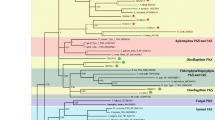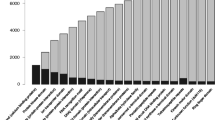Abstract
Rapidly developing techniques for manipulating the pathways of polyketide biosynthesis at the genomic level have created the demand for new pathways with novel biosynthetic capability. Polyketides derived from dinoflagellates are among the most complex and unique structures identified thus far, yet no studies of the biosynthesis of dinoflagellate-derived polyketides at the genomic level have been reported. Nine strains representing 7 different species of dinoflagellates were screened for the presence of type I and type II polyketide synthases (PKSs) by polymerase chain reaction (PCR) and reverse transcriptase PCR. Seven of the 9 strains yielded products that were homologous with known and putative type I PKSs. Unexpectedly, a PKS gene was amplified from cultures of the dinoflagellate Gymnodinium catenatum, a saxitoxin producer, which is not known to produce a polyketide. In each case the presence of a PKS gene was correlated with the presence of bacteria in the cultures as identified by amplification of the bacterial 16S ribosomal RNA gene. However, amplification from polyadenylated RNA, the lack of PKS expression in light-deprived cultures, residual phylogenetic signals, resistance to methylation-sensitive restriction enzymes, and the lack of hybridization to bacterial isolates support a dinoflagellate origin for most of these genes.
Similar content being viewed by others
Author information
Authors and Affiliations
Rights and permissions
About this article
Cite this article
Snyder, R., Gibbs, P., Palacios, A. et al. Polyketide Synthase Genes from Marine Dinoflagellates . Mar. Biotechnol. 5, 1–12 (2003). https://doi.org/10.1007/s10126-002-0077-y
Received:
Accepted:
Issue Date:
DOI: https://doi.org/10.1007/s10126-002-0077-y




